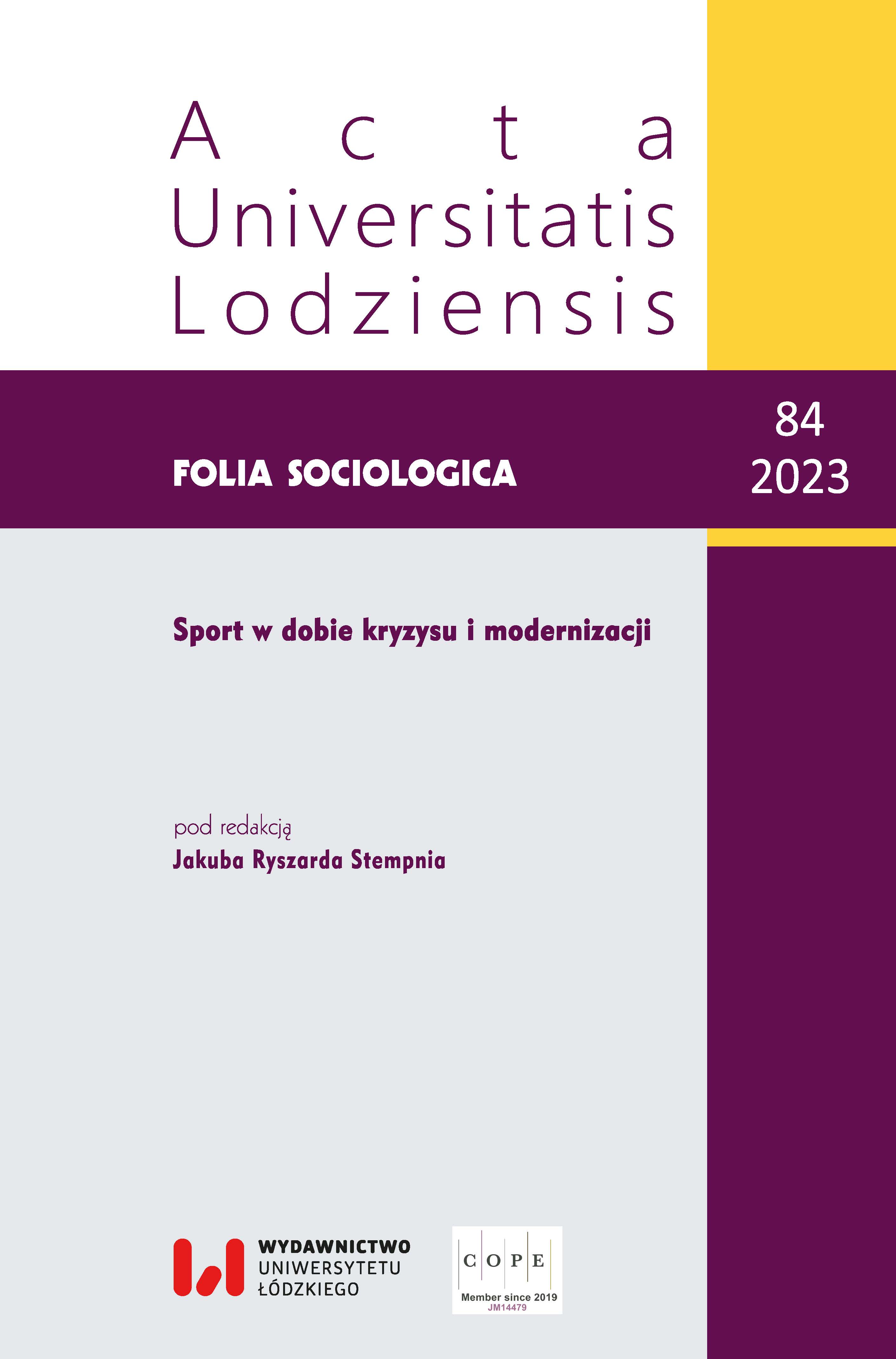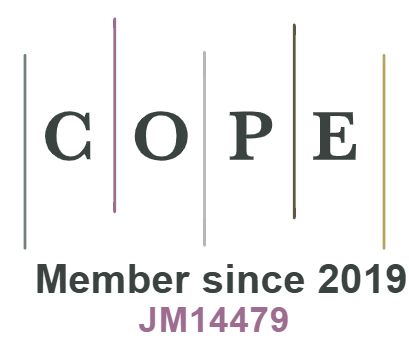Przygotowanie do współzawodnictwa w e-sporcie: growe wspólnoty praktyków
DOI:
https://doi.org/10.18778/0208-600X.84.05Słowa kluczowe:
e-sport, Magic, The Gathering, wspólnoty praktykówAbstrakt
Koncepcja wspólnoty praktyków zakłada, że jest to grupa osób, które łączy zamiłowanie do czegoś i które pogłębiają swoją wiedzę oraz doświadczenie w tym obszarze poprzez bieżące interakcje. Prezentowany artykuł skupia się na znaczeniu zinstytucjonalizowanych sieci relacji i wzajemnego uznania w przygotowaniach do rywalizacji w e-sporcie. Badanie stanowi przykład indukcyjnej jakościowej analizy. W jego ramach przeprowadzono indywidualne wywiady pogłębione z osobami (n = 12) mającymi znaczące osiągnięcia we współzawodnictwie w grze Magic: The Gathering (MTG). W społecznym świecie miłośników MTG liczne grupy odzwierciedlają funkcjonalność wspólnoty praktyków. Grupy te konstytuują podstawowy aspekt przygotowań do najważniejszych turniejów MTG. Przykłady funkcjonowania tak zwanych grup testingowych wśród miłośników MTG prowadzą do sformułowania nowej kategorii analitycznej – growych wspólnot praktyków. Wbrew stereotypom, prezentowane badania wspierają tezę o znaczącej roli gier wideo w kształtowaniu kompetencji społecznych i tworzeniu specyficznych wspólnot, co jest szczególnie istotne w kontekście pandemii COVID-19.
Bibliografia
Barr M. (2017), Video games can develop graduate skills in higher education students: A randomised trial, “Computers and Education”, no. 113, pp. 86–97.
Google Scholar
DOI: https://doi.org/10.1016/j.compedu.2017.05.016
Bertram R., Culver D., Gilbert W. (2017), A university sport coach community of practice: Using a value creation framework to explore learning and social interactions, “International Journal of Sports Science & Coaching”, vol. 12(3), pp. 287–302.
Google Scholar
DOI: https://doi.org/10.1177/1747954117710503
Bolisani E., Fedeli M., Bierema L., De Marchi V. (2021), United we adapt: communities of practice to face the CoronaVirus crisis in higher education, “Knowledge Management Research & Practice”, vol. 19(4), pp. 454–458.
Google Scholar
DOI: https://doi.org/10.1080/14778238.2020.1851615
Bowles R., O’Dwyer A. (2022), Identifying learning in a coaching community of practice: a collaborative self-study, “European Journal for Sport and Society”, vol. 19(3), pp. 214–231.
Google Scholar
DOI: https://doi.org/10.1080/16138171.2021.1930943
Campbell W., Goss A., Trottier K., Claypool M. (2021), Sports versus Esports: A Comparison of Industry Size, Viewer Friendliness, and Game Competitiveness, [in:] D. Yong Jin (ed.), Global esports: Transformation of Cultural Perceptions of Competitive Gaming, Bloomsbury, London, pp. 35–59.
Google Scholar
DOI: https://doi.org/10.5040/9781501368745.0007
Castells M. (2011), Społeczeństwo sieci, transl. M. Marody et al., Wydawnictwo Naukowe PWN, Warszawa.
Google Scholar
Chambers D. (2006), New Social Ties. Contemporary Connections in a Fragmented Society, Palgrave Macmillan, Basingstoke.
Google Scholar
Culver D., Trudel P. (2006), Cultivating coaches’ communities of practice: developing the potential for learning through interactions, [in:] R. Jones (ed.), The sports coach as educator: Reconceptualising Sports Coaching, Routledge, London, pp. 97–112.
Google Scholar
Gentile D.A., Anderson C.A., Yukawa S., Ihori N., Saleem M., Ming L.K., Shibuya A., Liau A.K., Khoo A., Bushman B.J., Rowell Huesmann L., Sakamoto A. (2009), The Effects of Prosocial Video Games on Prosocial Behaviors: International Evidence from Correlational, Longitudinal, and Experimental Studies, “Personality and Social Psychology Bulletin”, vol. 35(6), pp. 752–763.
Google Scholar
DOI: https://doi.org/10.1177/0146167209333045
Giddens A. (2012), Socjologia, transl. O. Siara, A. Szulżycka, P. Tomanek, Wydawnictwo Naukowe PWN, Warszawa.
Google Scholar
Gilbert W., Gallimore R., Trudel P. (2009), A learning community approach to coach development in youth sport, “Journal of Coaching Education”, vol. 2(2), pp. 3–23.
Google Scholar
DOI: https://doi.org/10.1123/jce.2.2.3
Goodyear V.A., Casey A. (2015), Innovation with change: developing a community of practice to help teachers move beyond the ‘honeymoon’ of pedagogical renovation, “Physical Education and Sport Pedagogy”, vol. 20(2), pp. 186–203.
Google Scholar
DOI: https://doi.org/10.1080/17408989.2013.817012
Hallmann K., Giel T. (2018), eSports – Competitive sports or recreational activity?, “Sport Management Rview”, vol. 21(1), pp. 14–20.
Google Scholar
DOI: https://doi.org/10.1016/j.smr.2017.07.011
Handley K., Clark T., Fincham R., Sturdy A. (2007), Researching situated learning: participation, identity and practices in client-consultant relationships, “Management Learning”, vol. 38(2), pp. 173–191.
Google Scholar
DOI: https://doi.org/10.1177/1350507607075774
Hettrick J. (2012), Online Video Games: Leadership Development for the Millennial College Student, https://scholarsarchive.jwu.edu/dissertations/AAI3542761/ (accessed: 28.11.2022).
Google Scholar
Hindin J., Hawzen M., Xue H., Pu H., Newman J. (2020), E-sports, [in:] J. Nauright, S. Zipp (eds.), Routledge Handbook of Global Sport, Routledge, London, pp. 405–415.
Google Scholar
DOI: https://doi.org/10.4324/9781315714264-36
Hsieh H., Shannon S.E. (2005), Three Approaches to Qualitative Content Analysis, “Qualitative Health Research”, vol. 15(9), pp. 1277–1288.
Google Scholar
DOI: https://doi.org/10.1177/1049732305276687
Jasny M. (2019), Sportowy wymiar „maniaczenia” przy komputerze, czyli kształtowanie sprawności fizycznej w ramach treningu w e-sporcie, [in:] D. Mańkowski, W. Woźniak (red.), Sport w ponowoczesności: konteksty, perspektywy badawcze, narracje, W Podwórku, Gdańsk, pp. 57–70.
Google Scholar
Jasny M. (2021), E-sport w ujęciu interakcjonistycznym, [in:] Z. Dziubiński, Z. Mazur (red.), Kultura fizyczna w interakcyjnej perspektywie. Praca zbiorowa, Akademia Wychowania Fizycznego, Salezjańska Organizacja Sportowa Rzeczpospolitej Polskiej, Warszawa, pp. 167–177.
Google Scholar
Ke X., Wagner C. (2022), Global pandemic compels sport to move to esports: understanding from brand extension perspective, “Managing Sport and Leisure”, vol. 27(1–2), pp. 152–157.
Google Scholar
DOI: https://doi.org/10.1080/23750472.2020.1792801
Kerno S.J. (2008), Limitations of communities of practice: a consideration of unresolved issues and difficulties in the approach, “Journal of Leadership & Organizational Studies”, vol. 15(1), pp. 69–78.
Google Scholar
DOI: https://doi.org/10.1177/1548051808317998
Kim Y.H., Nauright J., Suveatwatanakul C. (2020), The Rise of E-Sports and Potential for Post-COVID Continued Growth, “Sport in Society”, vol. 23(11), pp. 1861–1871.
Google Scholar
DOI: https://doi.org/10.1080/17430437.2020.1819695
Koperska N. (2021), Możliwość zastosowania gier komputerowych w treningu mentalnym, “Rocznik Lubuski”, vol. 47(2), pp. 101–116.
Google Scholar
López-Cabarcos M.Á., Ribeiro-Soriano D., Piñeiro-Chousa J. (2020), All That Glitters Is Not Gold. The Rise of Gaming in the COVID-19 Pandemic, “Journal of Innovation & Knowledge”, vol. 5(4), pp. 289–296.
Google Scholar
DOI: https://doi.org/10.1016/j.jik.2020.10.004
Lorenz R.C., Gleich T., Gallinat J., Kühn S. (2015), Video game training and the reward system, “Frontiers in Human Neuroscience”, vol. 9(40), pp. 1–9.
Google Scholar
DOI: https://doi.org/10.3389/fnhum.2015.00040
Magic: The Gathering Comprehensive Rules (2022), https://media.wizards.com/2022/downloads/MagicCompRules%2020220218.pdf (accessed: 29.11.2022).
Google Scholar
Magic: The Gathering Tournament Rules (2022), https://media.wpn.wizards.com/attachements/mtg_mtr_2022mar7_en.pdf (accessed: 29.11.2022).
Google Scholar
Nosal P. (2015), Społeczne ujęcie sportu. (Trudne) definiowanie zjawiska i jego dyskurs, “Przegląd Socjologii Jakościowej”, vol. 11(2), pp. 17–38.
Google Scholar
DOI: https://doi.org/10.18778/1733-8069.11.2.02
Pemberton J., Mavin S., Stalker B. (2007), Scratching beneath the surface of communities of (mal)practice, “The Learning Organization”, vol. 14(1), pp. 62–73.
Google Scholar
DOI: https://doi.org/10.1108/09696470710718357
Penney D., Kidman L. (2014), Promoting and supporting coaches’ professional leaning: Developing a Community of Practice, “The Journal of Athlete Centred Coaching”, vol. 1(1), pp. 6–31.
Google Scholar
Phelan S., Griffiths M. (2019), Reconceptualising professional learning through knowing-inpractice: a case study of a coaches high performance centre, “Sports Coaching Review”, vol. 8(2), pp. 103–123.
Google Scholar
DOI: https://doi.org/10.1080/21640629.2018.1424405
Przybylski A.K. (2014), Electronic Gaming and Psychosocial Adjustment, “Pediatrics”, vol. 134(3), pp. 716–722.
Google Scholar
DOI: https://doi.org/10.1542/peds.2013-4021
Sahaj T. (2021), Cyberatletyka, cybersporty, e-sporty, sporty elektroniczne. Kultura fizyczna i sport w “rozszerzonej rzeczywistości”, [in:] T. Sahaj, Marginalizowane grupy społeczne w kontekście kultury fizycznej i sportu, Akademia Wychowania Fizycznego im. Eugeniusza Piaseckiego, Poznań, pp. 20–70.
Google Scholar
Stempień J.R. (2020), Dysfunkcjonalizm metodologiczny – nowa propozycja analityczna w socjologii sportu i jej zastosowanie na przykładzie szachów, “Przegląd Socjologii Jakościowej”, vol. 16(1), s. 162–185.
Google Scholar
DOI: https://doi.org/10.18778/1733-8069.16.1.10
Taylor N. (2016), Play to the camera: video ethnography, spectatorship, and e-sports, “Convergence: The International Journal of Research into New Media Technologies”, vol. 22(2), pp. 115–130.
Google Scholar
DOI: https://doi.org/10.1177/1354856515580282
Thiel A., John J.M. (2018), Is eSport a “real” sport? Reflections on the Spread of Virtual Competitions, “European Journal for Sport and Society”, vol. 15(4), pp. 311–315.
Google Scholar
DOI: https://doi.org/10.1080/16138171.2018.1559019
Voisin N., Besombes N., Laffage-Cosnier S. (2022), Are Esports Players Inactive? A Systematic Review, “Physical Culture and Sport. Studies and Research”, vol. 97(1), pp. 32–52.
Google Scholar
DOI: https://doi.org/10.2478/pcssr-2022-0022
Wenger E., McDermott R., Snyder W. (2002), Cultivating Communities of Practice: A Guide to Managing Knowledge, Harvard Business School Press, Boston.
Google Scholar
Westmattelmann D., Grotenhermen J., Sprenger M., Schewe G. (2021), The show must go on – virtualisation of sport events during the COVID-19 pandemic, “European Journal of Information Systems”, vol. 30(2), pp. 119–136.
Google Scholar
DOI: https://doi.org/10.1080/0960085X.2020.1850186
Wright T., Trudel P., Culver D. (2007), Learning how to coach: the different learning situations reported by youth ice hockey coaches, “Physical Education & Sport Pedagogy”, vol. 12(2), pp. 127–144.
Google Scholar
DOI: https://doi.org/10.1080/17408980701282019
Pobrania
Opublikowane
Wersje
- 07-06-2023 - (2)
- 30-03-2023 - (1)
Jak cytować
Numer
Dział
Licencja

Utwór dostępny jest na licencji Creative Commons Uznanie autorstwa – Użycie niekomercyjne – Bez utworów zależnych 4.0 Międzynarodowe.










